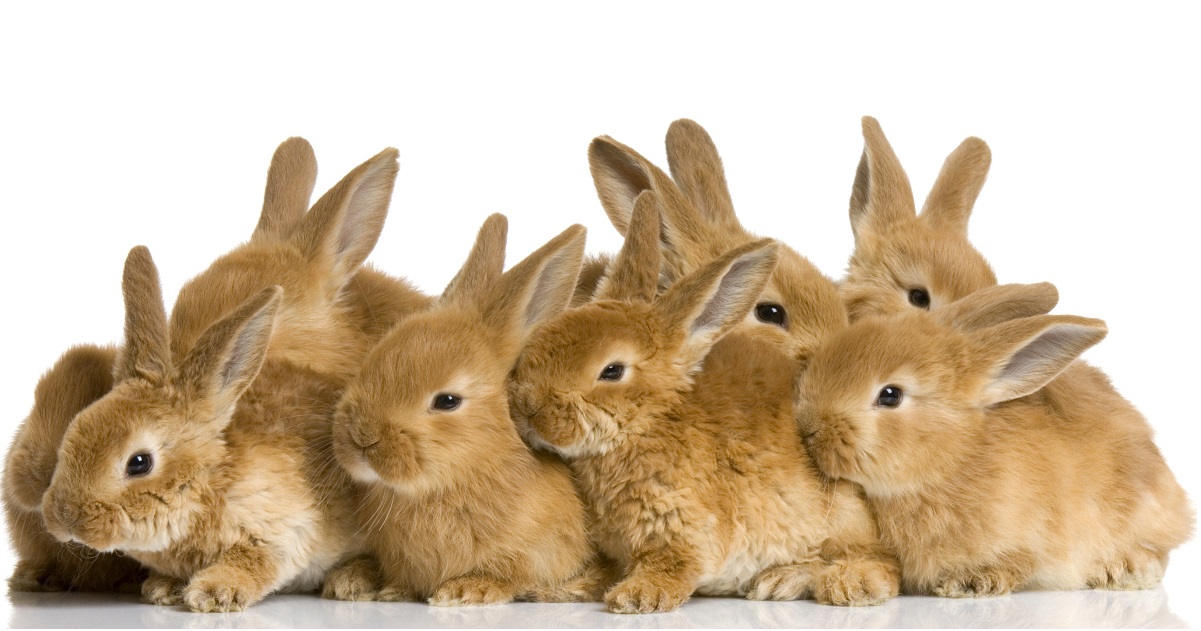
Baby rabbits, also referred to as kits, can be reared to adulthood by humans, but as always in these cases are a full time job. Certain needs have to be kept in mind; they need a warm, dry and quiet place of their own.
Usually the mortality in these cases is discouragingly high, depending on the age the mother stopped nursing them, if other nursing females are available with the litter of about the same age and preferably with a smaller litter as a female has about 8 to 10 nipples, they should be considered as a better alternative to hand rearing. Mixing the litters should be done under supervision, usually by covering the fostered kits with the doe’s hair can make the doe accept them, but I have to stress that you must supervise the transition as the female could reject them, and serious injuries and even death could occur.
Kits can be fed on greens around the age of 15-18 days, until then they can be fed with a homemade bunny milk, made by mixing 1/2 cup of kitten powder milk with 1/2 water, 1 egg yolk and 1 tablespoon of corn syrup.
Each batch has to be fresh made; storing it even in the refrigerator has a big chance of getting deteriorated, as the final product is a very good culture medium for bacteria. When preparing the milk I would recommend you to use boiled and cooled water or water that is from a safe source with as little to no bacteria and parasite contamination, if you are not sure, the boiled water is the best solution. The powder milk dissolve better in hot water, but after reconstituting the powdered milk you should chill the milk a bit, as mixing the egg yolk in hot milk will leave you with a big omelet as the egg protein will coagulate in contact with heat.
The milk should be warm when administered, check the milk temperature, the procedure is the same with the human babies, put a few droplets of milk on your wrist, in case the milk is too cold or to hot you will feel the difference for sure. If the milk is too cold you can boil some water in a pot and put the milk bottle in a bain-marie inside the pot; if the milk is to hot open the cold water tap and hold the bottle under the running water for a few seconds, then recheck the milk temperature on the wrist.
Feeding should occur 3 to 5 times a day; the quantity should start from 1/2 tablespoon to 2 tablespoons of mixed milk, depending on the age of the kit.
Some brands of kitten milk come in a box with a milk bottle, if not, you can buy one from the veterinary or human pharmacy, after each use, discard the contents of the bottle and wash well with hot water and a baby bottle brush, avoid using any soap or detergent for cleaning. Starting with the age of 2 weeks hay can be introduced in tot the bunny’s nutrition.
In to the milk and egg mixture, powdered probiotics can be mixed in order to prevent possible gastrointestinal disturbances and prevent diarrhea.
House the bunnies in a cardboard or wooden box lined with facial wipes or handkerchiefs, if soiled remove them, to ensure a good sanitation for the bunnies. After each feeding wipe the perianal area with a wet cotton ball that was dampened with warm water, this will stimulate the kits to urinate and defecate.
Monitor the bunnies closely, at this age gastrointestinal disturbances and dehydration are the main reasons for mortality. If diarrhea starts in the bunny nest, take them to a veterinarian as soon as possible.
You can ensure a warm nest by putting a heated pad over one corner of the box in which you house the kits, make sure you don’t cover the whole box opening, and don’t leave the electrical cord hang in to the box, as it might get bitten and electrocution can happen. The box should be kept on the floor in an area, sheltered from drafts and cold.
Please feel free to comment below and share your thoughts or personal experiences about caring for an orphaned rabbit.
Share this article in your favorite social media outlets.







Caring a rabbit is quite tougher than caring other pets. They need special rabbit bunny supplies. You shared good thoughts relatable to pet bunnies care. I also love rabbits and while searching tips for bunny care, I got your blog. Really great information you have published. Keep up sharing your thoughts.